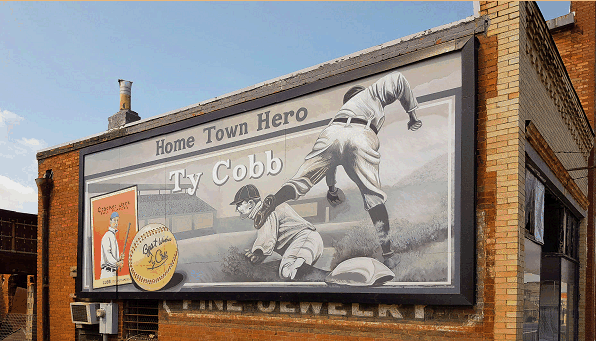


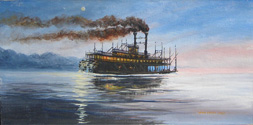












Southern Exposure
Baseball Legend Ty Cobb and the Winter He Once Spent on Stage Starring in a Romantic Comedy Touring Throughout the South
It is not every day that one encounters a musician quite like John D'Amato. Scores of recording artists emulate their idols and mentors, and John certainly has his share of influences, but he is distincly different from many of his colleagues in that he has found his place in the field of blues after experiencing genuine struggles, heartbreak and loss. John's willingness to communicate such personal feelings and emotions has resulted in a growing following of fans whose own fears, vulnerabilities and hardships leave them feeling a unique connection to his repertoire of music. Music, especially roots genres like blues and gospel, promotes healing and fosters fellowship, and John has learned to use his craft to advantage.

Those Wonderful Ads!
Older issues of Grier's Almanac are desired by collectors because of the advertising. Within the pages of the 1934 issue (pictured below right), one can find ads for Bayer aspirin, Cheney's Expectorant (for coughs) and Feen-a-mint ("The Laxative That's Just Like Chewing Gum"). While these products were quite common and widely used at the time, a few other items were offered by more obscure companies, and following are just a few of the standouts:
Lots of Useful Stuff, Too
Besides a few hilarious ads and plenty of legitimate promotions, Grier's Almanac contains a helpful gardening calendar, zodiac information, a religious section, a chronological listing of memorable events and informing general interest articles.
Older issues of Grier's Almanac are desired by collectors because of the advertising. Within the pages of the 1934 issue (pictured below right), one can find ads for Bayer aspirin, Cheney's Expectorant (for coughs) and Feen-a-mint ("The Laxative That's Just Like Chewing Gum"). While these products were quite common and widely used at the time, a few other items were offered by more obscure companies, and following are just a few of the standouts:
- 6 6 6 a remedy for colds, headache, fever, biliousness, malaria and constipation available in liquid, tablets, nose drops and a salve! (Editor's note: I'd have to be pretty miserable before I would take something called "666.")
- Smith's Worm Oil, a product of the Galenol Company, Inc. of Atlanta. Described as "one of the oldest and most reliable worm medicines sold."
- Lydia E. Pinkham's Vegetable Compound, a "tonic and regulator" for "girls in their teens." The ad states, "Teach her how to guard her health at this critical time . . . When she is a happy, healthy wife and mother she will thank you."
- Securitee, a "renowned prescription in a jellied form" described as the "married woman's sure, safe method." "Are you financially able to take care of babies and give them the proper attention?," the ad asks. "If not it may be best to delay." Haven't times changed? Today, there is considerable debate over whether school kids should learn about contraception and the prevention of sexually transmitted diseases at younger and younger ages. In 1934, amid the Depression, an ad offering some form of pregnancy prevention made no mention of the word sex, of course, but its intent was pretty clear. "Every married couple should have babies, but it is a great injustice to bring the little darlings into the world if all conditions are not just right." Interesting to note, 1934 was probably not one of those years in which conditions were "just right" for raising children for most southern couples.
- Lucky Las Vegas Cologne (Editor's note: If you're willing to throw away your money at the casinos, spending $5.55 on this stuff probably can't hurt!)
- Dragon's Blood Uncrossing Bubble Bath, "used to destroy jinxes" (Editor's note: A normal shower with soap and water suits me just fine. Jinxes don't scare me.)
- "Make Opposing Lawyer Stupid" Oil and Candle (Editor's note: This must have been used by the O. J. Simpson defense team. Oops, I shouldn't have said that!!!)
- "Stop Evil" Spray Cleaner "Chase evil out of home, church, business," says the ad. (Editor's note: Obeying the Bible and saying, "Get thee behind me, Satan," has always worked for me!)
Lots of Useful Stuff, Too
Besides a few hilarious ads and plenty of legitimate promotions, Grier's Almanac contains a helpful gardening calendar, zodiac information, a religious section, a chronological listing of memorable events and informing general interest articles.
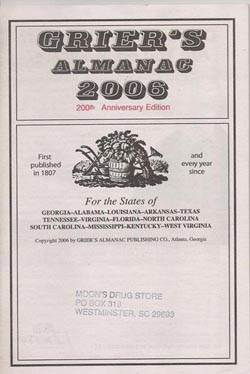
Royston, Georgia's Hometown Hero is Honored with this Mural on a Downtown Store Building Wall
By Andrew H. Martin
During a 24-year major league baseball career (1905-1928), primarily with the Detroit Tigers, native Georgian Ty Cobb was known for his aggressive play, which resulted in a record career batting average of .366 and spurred his eventual induction in the National Baseball Hall of Fame. However, at the height of his baseball success, he spent one off season headlining a theatre troupe touring through the South, which showed him in a whole new light.
Cobb left a complicated legacy that has evolved over time. A biography published by Al Stump shortly after his death in 1961 painted him as a bigot, but recent research, led by author Charles Leerhsen, has found such claims to be unsubstantiated. What has never been in doubt is his reputation as a fiercely competitive athlete; unrivaled in the history of the game.
The "Georgia Peach" was as successful off the field as he was on it. He ultimately became a millionaire many times over, with much of his wealth coming from investing in Coca Cola and identifying unique ventures to capitalize on his baseball fame.
Players of the era commonly supplemented their income with various off-season jobs. Despite annually being one of the best-paid players in baseball, Cobb was no exception.
In the fall of 1911, Cobb was 25 and had just hit an amazing .420 for the Tigers. He was the face of baseball and everyone wanted a piece of him. He fielded numerous lucrative offers, but came to terms with Vaughan Glaser, an actor and director, who oversaw a Georgia-based theater company and wanted him to headline a play.
Dan Holmes wrote in Ty Cobb: A Biography, that Glaser reportedly offered Cobb $8,400 to play the part of Billy Bolton, a football player wooed by the daughter of a college president to recruit him to play for her father's school, in the production of The College Widow. The popular romantic comedy had already had a successful run on Broadway and years later was made into the Marx Brothers film, Horse Feathers.
Cobb had previously seen the play in Detroit. Although he had eschewed other theatrical offers, he believed this role would uphold his reputation and not strain his lack of acting experience. The show was scheduled to tour during the late fall and early winter months, including an extensive jaunt through the South to showcase their favorite son.
Initially, he wasn't the only ballplayer in the troupe, as Shoeless Joe Jackson, a painfully shy outfielder with the Cleveland Indians, and his closest peer as a hitter, had also signed on. However, the quiet South Carolinian got stage fright and returned home before the tour began.
Cobb's presence alone drew large crowds every time the curtain went up. However, the production was also quite entertaining, and he shocked many with his acting ability. One writer, taken aback, explained, "without doubt, [Cobb] has been the dramatic find and surprise of the current season."
He continued, "The simple fact that Cobb really acts and acts in a manner which ranks him high in his new calling is very refreshing... It might well be said that he is a better ball player than any actor and a better actor than any ball player."
According to Cobb, playing in front of thousands helped him quickly adapt. "Much to my surprise, I managed to get through my first night on the stage without that awful bugaboo, 'stage fright,' attacking my heart and dropping me in my tracks… It was just like figuring out what kind of a ball a pitcher was going to put over. I knew it was coming and waited for it. A few appearances on the stage gave me reassurance and now I am perfectly at home. I find stage work wonderfully interesting and I like it."
Cobb worked equally hard off-stage to market the production. Upon reaching Nashville, he mimicked his character by donning a uniform and practicing with the Vanderbilt football team. One publication excitedly touted his arrival to the city, "On the stage Mr. Cobb is maintaining the same high average that has marked his work on the diamond."
Unfortunately, not all reviews were glowing. Allen G. Johnson, the sports editor of the Birmingham News, was upset when Cobb gave a half-hearted effort as guest editor for his paper; furnishing just a brief generic statement promising the Tigers would win the 1912 pennant.
Despite the show receiving two curtain calls in Birmingham, Johnson published a scathing review of Cobb's acting. The two men also exchanged heated letters. Cobb wrote, "I am a better actor than you are, a better sports editor than you are, a better dramatic critic than you are. I make more money than you do, and I know I am a better ball player-so why should inferiors criticize superiors?" Johnson challenged him to a baseball game for the "championship of the world." The ridiculous offer went unanswered.
At the height of the show's popularity, Cobb shockingly decided to leave the production, after nearly 10 weeks. He explained, "Here I am at the end of several months on the boards four pounds under my playing weight when under . . . more natural conditions I should be from five to ten pounds over that notch. I am becoming nervous and I miss my regular sleep. It was my ambition… to become a good actor, but in attaining that object I see that my usefulness as a baseball player is bound to suffer and so I have decided to cut out the stage for the pastime which first made me the reputation I enjoy."
Other possible motivations later emerged as to his abrupt departure. Historian Dennis Abrams wrote that Cobb felt uncomfortable kissing his female co-star and also worried that the bright stage lights might damage his refined batting eye.
Cobb returned home and spent several weeks with his family before starting a new baseball season. He went on to win his sixth consecutive batting title with a .409 average, but his Tigers had a losing record and finished in a disappointing sixth place.
While he never returned to the stage, The College Widow wasn't Cobb's only foray into show business. In 1916, he pocketed $25,000 plus expenses to star in the silent film Somewhere in Georgia. It was produced by Sunbeam Motion Picture Corporation, which employed Vaughan Glaser as vice president.
Historian Rob Edelman described the plot of the now-lost film as "Ty Cobb, a poor but upright bank clerk and part-time ballplayer who competes with a smarmy cashier for the affection of the boss's daughter. Meanwhile, his ball playing is scrutinized by the Detroit Tigers and he is signed to a professional contract… He is momentarily foiled by some ruffians in the employ of his rival before winning both the climactic game and the girl."
The reception and success of the film has been lost to time, but the production made Cobb the first major league player to appear in a movie.
Popular athletes dabbling in show business still draw intense scrutiny and interest today, remaining unchanged since Cobb was on the stage. Despite the crowds, accolades and money, he knew baseball was his bread and butter. Nevertheless, for a 10-week stretch, the outfielder was the hottest name on the theatre circuit.
Sources
Dennis Abrams. Ty Cobb, New York: Chelsea House Publishers, 2007.
Rob Edelman. The Great Baseball Films: From Right Off the Bat to a League of their Own, New York: Carol Publishing Group, 1994.
Ty Cobb with Al Stump. My Life in Baseball: The True Record, Lincoln and London: University of Nebraska Press, 1993.
Dan Holmes. Ty Cobb: A Biography, Westport, Connecticut: Greenwood Press, 2004.
Charles Leerhsen. Ty Cobb: A Terrible Beauty, New York: Simon & Schuster Paperbacks, 2015.
Al Stump. Cobb: A Biography, Chapel Hill, North Carolina: Algonquin Books of Chapel Hill, 1996.
Author: Andrew H. Martin. Published February 8, 2020.
During a 24-year major league baseball career (1905-1928), primarily with the Detroit Tigers, native Georgian Ty Cobb was known for his aggressive play, which resulted in a record career batting average of .366 and spurred his eventual induction in the National Baseball Hall of Fame. However, at the height of his baseball success, he spent one off season headlining a theatre troupe touring through the South, which showed him in a whole new light.
Cobb left a complicated legacy that has evolved over time. A biography published by Al Stump shortly after his death in 1961 painted him as a bigot, but recent research, led by author Charles Leerhsen, has found such claims to be unsubstantiated. What has never been in doubt is his reputation as a fiercely competitive athlete; unrivaled in the history of the game.
The "Georgia Peach" was as successful off the field as he was on it. He ultimately became a millionaire many times over, with much of his wealth coming from investing in Coca Cola and identifying unique ventures to capitalize on his baseball fame.
Players of the era commonly supplemented their income with various off-season jobs. Despite annually being one of the best-paid players in baseball, Cobb was no exception.
In the fall of 1911, Cobb was 25 and had just hit an amazing .420 for the Tigers. He was the face of baseball and everyone wanted a piece of him. He fielded numerous lucrative offers, but came to terms with Vaughan Glaser, an actor and director, who oversaw a Georgia-based theater company and wanted him to headline a play.
Dan Holmes wrote in Ty Cobb: A Biography, that Glaser reportedly offered Cobb $8,400 to play the part of Billy Bolton, a football player wooed by the daughter of a college president to recruit him to play for her father's school, in the production of The College Widow. The popular romantic comedy had already had a successful run on Broadway and years later was made into the Marx Brothers film, Horse Feathers.
Cobb had previously seen the play in Detroit. Although he had eschewed other theatrical offers, he believed this role would uphold his reputation and not strain his lack of acting experience. The show was scheduled to tour during the late fall and early winter months, including an extensive jaunt through the South to showcase their favorite son.
Initially, he wasn't the only ballplayer in the troupe, as Shoeless Joe Jackson, a painfully shy outfielder with the Cleveland Indians, and his closest peer as a hitter, had also signed on. However, the quiet South Carolinian got stage fright and returned home before the tour began.
Cobb's presence alone drew large crowds every time the curtain went up. However, the production was also quite entertaining, and he shocked many with his acting ability. One writer, taken aback, explained, "without doubt, [Cobb] has been the dramatic find and surprise of the current season."
He continued, "The simple fact that Cobb really acts and acts in a manner which ranks him high in his new calling is very refreshing... It might well be said that he is a better ball player than any actor and a better actor than any ball player."
According to Cobb, playing in front of thousands helped him quickly adapt. "Much to my surprise, I managed to get through my first night on the stage without that awful bugaboo, 'stage fright,' attacking my heart and dropping me in my tracks… It was just like figuring out what kind of a ball a pitcher was going to put over. I knew it was coming and waited for it. A few appearances on the stage gave me reassurance and now I am perfectly at home. I find stage work wonderfully interesting and I like it."
Cobb worked equally hard off-stage to market the production. Upon reaching Nashville, he mimicked his character by donning a uniform and practicing with the Vanderbilt football team. One publication excitedly touted his arrival to the city, "On the stage Mr. Cobb is maintaining the same high average that has marked his work on the diamond."
Unfortunately, not all reviews were glowing. Allen G. Johnson, the sports editor of the Birmingham News, was upset when Cobb gave a half-hearted effort as guest editor for his paper; furnishing just a brief generic statement promising the Tigers would win the 1912 pennant.
Despite the show receiving two curtain calls in Birmingham, Johnson published a scathing review of Cobb's acting. The two men also exchanged heated letters. Cobb wrote, "I am a better actor than you are, a better sports editor than you are, a better dramatic critic than you are. I make more money than you do, and I know I am a better ball player-so why should inferiors criticize superiors?" Johnson challenged him to a baseball game for the "championship of the world." The ridiculous offer went unanswered.
At the height of the show's popularity, Cobb shockingly decided to leave the production, after nearly 10 weeks. He explained, "Here I am at the end of several months on the boards four pounds under my playing weight when under . . . more natural conditions I should be from five to ten pounds over that notch. I am becoming nervous and I miss my regular sleep. It was my ambition… to become a good actor, but in attaining that object I see that my usefulness as a baseball player is bound to suffer and so I have decided to cut out the stage for the pastime which first made me the reputation I enjoy."
Other possible motivations later emerged as to his abrupt departure. Historian Dennis Abrams wrote that Cobb felt uncomfortable kissing his female co-star and also worried that the bright stage lights might damage his refined batting eye.
Cobb returned home and spent several weeks with his family before starting a new baseball season. He went on to win his sixth consecutive batting title with a .409 average, but his Tigers had a losing record and finished in a disappointing sixth place.
While he never returned to the stage, The College Widow wasn't Cobb's only foray into show business. In 1916, he pocketed $25,000 plus expenses to star in the silent film Somewhere in Georgia. It was produced by Sunbeam Motion Picture Corporation, which employed Vaughan Glaser as vice president.
Historian Rob Edelman described the plot of the now-lost film as "Ty Cobb, a poor but upright bank clerk and part-time ballplayer who competes with a smarmy cashier for the affection of the boss's daughter. Meanwhile, his ball playing is scrutinized by the Detroit Tigers and he is signed to a professional contract… He is momentarily foiled by some ruffians in the employ of his rival before winning both the climactic game and the girl."
The reception and success of the film has been lost to time, but the production made Cobb the first major league player to appear in a movie.
Popular athletes dabbling in show business still draw intense scrutiny and interest today, remaining unchanged since Cobb was on the stage. Despite the crowds, accolades and money, he knew baseball was his bread and butter. Nevertheless, for a 10-week stretch, the outfielder was the hottest name on the theatre circuit.
Sources
Dennis Abrams. Ty Cobb, New York: Chelsea House Publishers, 2007.
Rob Edelman. The Great Baseball Films: From Right Off the Bat to a League of their Own, New York: Carol Publishing Group, 1994.
Ty Cobb with Al Stump. My Life in Baseball: The True Record, Lincoln and London: University of Nebraska Press, 1993.
Dan Holmes. Ty Cobb: A Biography, Westport, Connecticut: Greenwood Press, 2004.
Charles Leerhsen. Ty Cobb: A Terrible Beauty, New York: Simon & Schuster Paperbacks, 2015.
Al Stump. Cobb: A Biography, Chapel Hill, North Carolina: Algonquin Books of Chapel Hill, 1996.
Author: Andrew H. Martin. Published February 8, 2020.
Copies of Grier's Almanac are distributed via drug stores, feed & seed dealers and direct mail.
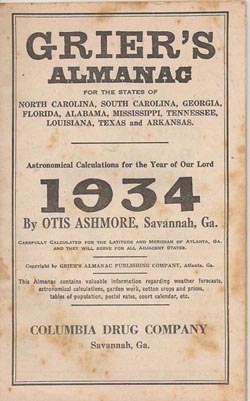
For nearly half a century, Thomas P. Ashmore made the astronomical calculations for Grier's Almanac. Upon his death in 1882, he was succeeded by his nephew, Otis Ashmore. A Savannah educator and scientist, Otis Ashmore saw the almanac fall on hard times. It was in 1912 that Frank Lamar Fleming of John B. Daniel, Inc., an Atlanta wholesale drug company, acquired the publication at a Savannah bankruptcy auction. In spite of the ownership change, Otis Ashmore remained with Grier's, making astronomical calculations until his death in 1934. Pictured is his last issue.
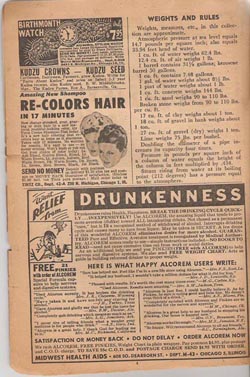
This sampling from the 1953 issue of Grier's Almanac features a half-page ad offering an "amazing liquid that tends to promote aversion (dislike) toward ALL intoxicating drinks." Also, kudzu had apparently not sufficiently invaded the South by 1953. B. W. Middlebrooks of Barnesville, Georgia, was advertising seed and kudzu crowns for sale! Quite a contrast from the previously illustrated 1934 edition, the 1953 issue featured ads from two separate publishers promoting illustrated books on the topic of sex!
BIBLIOGRAPHY
Frank Veale Jr., "Georgia's Amazing Robert Grier: They Forgot Him, But Not Almanack," Atlanta Journal, October 7, 1967.
"Grier's Almanac," New Georgia Encyclopedia. Retrieved May 15, 2006: http://www.newgeorgiaencyclopedia.org
"This Day in Georgia History: January 9: 1780," Carl Vinson Institute of Government (University of Georgia). Retrieved October 2004: http://www.cviog.uga.edu
OTHER SOURCES
Telephone conversations with Bryan Bachler, Grier's Almanac Publishing Company, Atlanta, in October 2004 and on January 19, 2005
1934 Grier's Almanac
1953 Grier's Almanac
2006 Grier's Almanac
Frank Veale Jr., "Georgia's Amazing Robert Grier: They Forgot Him, But Not Almanack," Atlanta Journal, October 7, 1967.
"Grier's Almanac," New Georgia Encyclopedia. Retrieved May 15, 2006: http://www.newgeorgiaencyclopedia.org
"This Day in Georgia History: January 9: 1780," Carl Vinson Institute of Government (University of Georgia). Retrieved October 2004: http://www.cviog.uga.edu
OTHER SOURCES
Telephone conversations with Bryan Bachler, Grier's Almanac Publishing Company, Atlanta, in October 2004 and on January 19, 2005
1934 Grier's Almanac
1953 Grier's Almanac
2006 Grier's Almanac
Copyright
Southern Edition
All Rights Reserved
Southern Edition
All Rights Reserved
All materials contained on this site, including text and images, are protected by copyright laws and may not be reproduced without prior written permission from the publisher. Where applicable, use of some items contained on this site may require permission from other copyright owners.
Fair Use of text from SouthernEdition.com is permitted to the extent allowed by copyright law. Proper citation is requested. Please use this guide when citing a Southern Edition article.
Contact Greg Freeman or SouthernEdition.comFair Use of text from SouthernEdition.com is permitted to the extent allowed by copyright law. Proper citation is requested. Please use this guide when citing a Southern Edition article.
